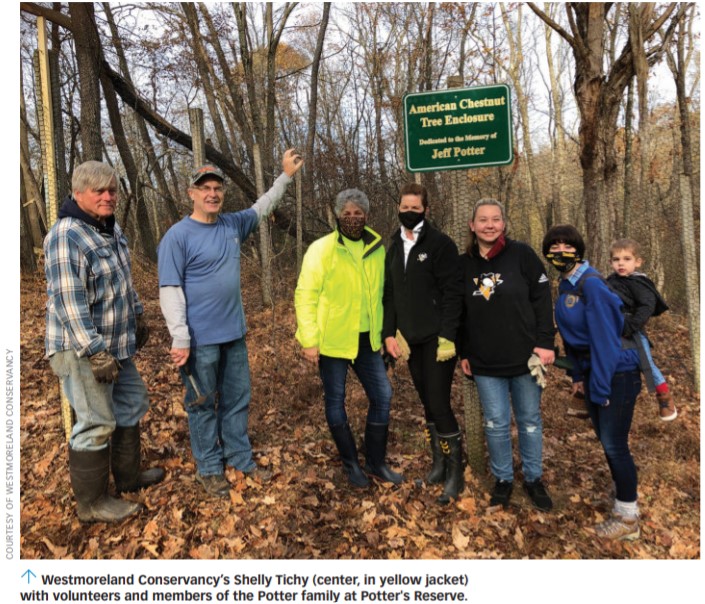Catch-up on the latest Accreditation Corner from the Land Trust Alliance's Saving Land magazine.

Accreditation at Any Size: How All-Volunteer Land Trusts Make Accreditation a Reality
by Caity Pinkard
In 2010, the Westmoreland Conservancy, an all-volunteer land trust based in Pennsylvania, was presented with an opportunity to have a consultant help guide them through the accreditation process. “Accreditation was a topic discussed at several board meetings, as the movement became increasingly visible,” recalls Shelly Tichy, the current president of Westmoreland Conservancy. “Ultimately, the board decided to pursue the opportunity.”
But even with this support, Westmoreland's decision to go through the process was not undertaken lightly. "In general, the process is intimidating," Tichy says. While her organization made every effort to follow best practices, challenges often arose with older acquisitions. "As an organization that had been protecting land for more than 20 years as volunteers, it was necessary to pull together documents and create policies to meet standards."
While that can be an investment of time and resources for any land trust, it is particularly true of all-volunteer land trusts without full-time, dedicated staff. "The turnover of volunteers made the process challenging," Tichy admits.
Fortunately, Westmoreland was able to turn that challenge into an opportunity to share information more freely, work together as a team and treat accreditation as a "promise to do better." As a result, Westmoreland achieved accreditation in 2013 and renewal in 2019.
Since 2013, Westmoreland has received 318 acres in land gifts, which Tichy sees as a reflection of the rigor that accreditation represents. "We believe our donors see us as a stable, dependable and committed organization, capable of protecting the lands that they hold dear," she says. "Accreditation illustrates to potential donors that Westmoreland Conservancy is an organization committed to excellence."
While many all-volunteer land trusts might view accreditation as out of reach, Tichy urges them to reconsider. Commission Executive Director Melissa Kalvestrand agrees. "One of the Commission's core values is service, which highlights our commitment to working cooperatively with land trusts of all types and sizes," she says.
"The accreditation process is rigorous," Kalvestrand admits. "But every land trust has found opportunities to strengthen their practices as a result. The accreditation process truly seeks to understand the unique story of an organization while ensuring conservation excellence through verified implementation of Land Trust Standards and Practices."
Tichy feels that her organization is stronger for going through the accreditation process and credits her team of hard-working volunteers with making it all possible. "All-volunteer organizations are run by people who make the time to achieve their goals, and the process can be wearing on both the individuals and the organization." By putting in the work after normal business hours, Westmoreland's volunteers were able to exceed those goals and make accreditation possible for the organization. "I personally believe Westmoreland Conservancy to be a stronger, more focused organization than before."
Fortunately, Westmoreland was able to turn that challenge into an opportunity to share information more freely, work together as a team and treat accreditation as a "promise to do better." As a result, Westmoreland achieved accreditation in 2013 and renewal in 2019.
Since 2013, Westmoreland has received 318 acres in land gifts, which Tichy sees as a reflection of the rigor that accreditation represents. "We believe our donors see us as a stable, dependable and committed organization, capable of protecting the lands that they hold dear," she says. "Accreditation illustrates to potential donors that Westmoreland Conservancy is an organization committed to excellence."
While many all-volunteer land trusts might view accreditation as out of reach, Tichy urges them to reconsider. Commission Executive Director Melissa Kalvestrand agrees. "One of the Commission's core values is service, which highlights our commitment to working cooperatively with land trusts of all types and sizes," she says.
"The accreditation process is rigorous," Kalvestrand admits. "But every land trust has found opportunities to strengthen their practices as a result. The accreditation process truly seeks to understand the unique story of an organization while ensuring conservation excellence through verified implementation of Land Trust Standards and Practices."
Tichy feels that her organization is stronger for going through the accreditation process and credits her team of hard-working volunteers with making it all possible. "All-volunteer organizations are run by people who make the time to achieve their goals, and the process can be wearing on both the individuals and the organization." By putting in the work after normal business hours, Westmoreland's volunteers were able to exceed those goals and make accreditation possible for the organization. "I personally believe Westmoreland Conservancy to be a stronger, more focused organization than before."
Caity Pinkard is a freelance writer and communications manager at Conservation Strategy Fund.
-----------
This is the first story in a series that will explore how land trusts of any size can achieve accreditation.
To see the full archive of Accreditation Corners and to view this story as a PDF please visit our Accreditation Corners page.




